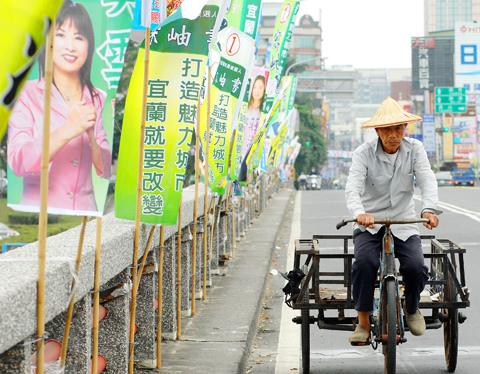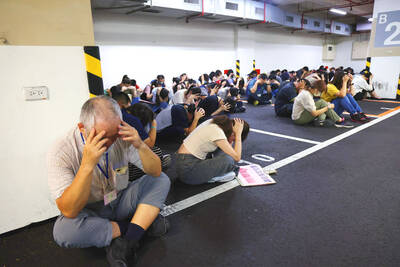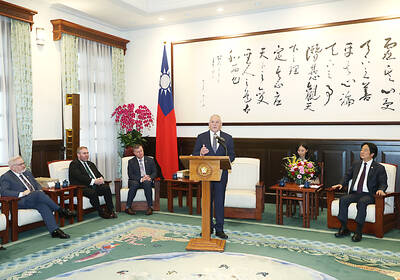Taiwan should be a shining example of democracy in East Asia, but it is tainted by vote-buying, and tomorrow’s local elections are no exception, observers said.
Voters will go to the polls to elect mayors, county chiefs and city councilors across the country amid reports of candidates spending their way into public office despite vows to the opposite.
“We will not buy votes during the elections and we will not become corrupt as the ruling party,” President Ma Ying-jeou (馬英九), also the chairman of the Chinese Nationalist Party (KMT), said late last month.

PHOTO: AFP
Just days after Ma spoke, however, Ministry of Justice data showed prosecutors were investigating 128 alleged vote-buying cases for local mayor and county chief elections and 807 cases in local councilor elections.
“If you look at other East Asian countries like South Korea and Japan, I’d say vote-buying [here] is worse ... by far,” said Christian Schafferer, a political scientist at the Overseas Chinese University.
The situation is particularly serious in rural areas, where local politicians enjoy enormous prestige and often have close personal connections with the voters.
“In the big cities, young people will take the money and vote for whomever they want to, or not vote at all. But older people in the countryside may feel a moral obligation,” Schafferer said.
Part of the explanation is history, traceable back to the end of World War II in 1945, when a defeated Japan gave up 50 years of colonial rule over Taiwan.
When the KMT arrived, it had no links to Taiwanese society and it had to ally itself with existing powerbrokers.
They were typically to be found among influential families who had dominated their communities for generations, offering protection against disaster and public goods in return for grassroots support.
Even today, these families are often still in charge and are more crucial at the local level than the big national parties, said Alexander Tan, an expert on Taiwanese politics at New Zealand’s University of Canterbury.
“Public office is seen as a private thing. They run it like a private corporation. It’s quite entrenched,” he said. “The party is the big dog, and the tail is the local politicians, and the tail wags the dog.”
The price of a vote can range from NT$500 to several thousand depending on how close the race is, said Wang Yeh-lih (王業立), a political science professor at National Taiwan University.
“Candidates usually buy votes through their key campaign staff, who have close ties with the local communities,” Wang said. “The situation has been improving in recent years, with more local staffers being prosecuted for vote-buying.”
Weeding out the practice completely could be hard because the local factions remain crucial for political parties’ ability to extend their power to all corners of society.
“Local families are the ones that have to be courted by the large parties, so in some sense, it’s easier for the parties to look the other way and ignore what’s happening,” Tan said.
“If party A says it wants to clean it up, local politicians will ask, ‘How about party B, do you want to go with us?’” he said.
There is little doubt the harmful impact on democracy is real and often prevents the voice of the people being reflected in election results, observers said.
“In an election for county chief, you have to engage in massive buying, but if it’s an election for the city council, you don’t need so many votes,” Schafferer said. “You can actually take out the other candidate by buying votes. Then of course it’s not good for democracy.”

Taipei on Thursday held urban resilience air raid drills, with residents in one of the exercises’ three “key verification zones” reporting little to no difference compared with previous years, despite government pledges of stricter enforcement. Formerly known as the Wanan exercise, the air raid drills, which concluded yesterday, are now part of the “Urban Resilience Exercise,” which also incorporates the Minan disaster prevention and rescue exercise. In Taipei, the designated key verification zones — where the government said more stringent measures would be enforced — were Songshan (松山), Zhongshan (中山) and Zhongzheng (中正) districts. Air raid sirens sounded at 1:30pm, signaling the

The number of people who reported a same-sex spouse on their income tax increased 1.5-fold from 2020 to 2023, while the overall proportion of taxpayers reporting a spouse decreased by 4.4 percent from 2014 to 2023, Ministry of Finance data showed yesterday. The number of people reporting a spouse on their income tax trended upward from 2014 to 2019, the Department of Statistics said. However, the number decreased in 2020 and 2021, likely due to a drop in marriages during the COVID-19 pandemic and the income of some households falling below the taxable threshold, it said. The number of spousal tax filings rebounded

A saleswoman, surnamed Chen (陳), earlier this month was handed an 18-month prison term for embezzling more than 2,000 pairs of shoes while working at a department store in Tainan. The Tainan District Court convicted Chen of embezzlement in a ruling on July 7, sentencing her to prison for illegally profiting NT$7.32 million (US$248,929) at the expense of her employer. Chen was also given the opportunity to reach a financial settlement, but she declined. Chen was responsible for the sales counter of Nike shoes at Tainan’s Shinkong Mitsukoshi Zhongshan branch, where she had been employed since October 2019. She had previously worked

‘NON-RED’: Taiwan and Ireland should work together to foster a values-driven, democratic economic system, leveraging their complementary industries, Lai said President William Lai (賴清德) yesterday expressed hopes for closer ties between Taiwan and Ireland, and that both countries could collaborate to create a values-driven, democracy-centered economic system. He made the remarks while meeting with an Irish cross-party parliamentary delegation visiting Taiwan. The delegation, led by John McGuinness, deputy speaker of the Irish house of representatives, known as the Dail, includes Irish lawmakers Malcolm Byrne, Barry Ward, Ken O’Flynn and Teresa Costello. McGuinness, who chairs the Ireland-Taiwan Parliamentary Friendship Association, is a friend of Taiwan, and under his leadership, the association’s influence has grown over the past few years, Lai said. Ireland is